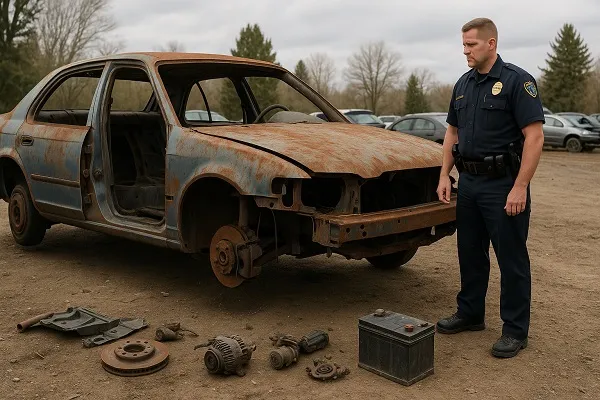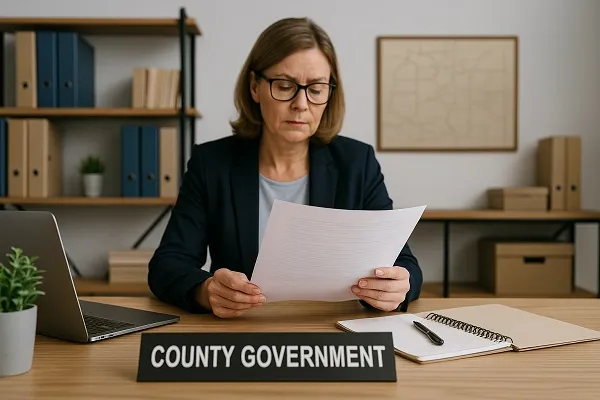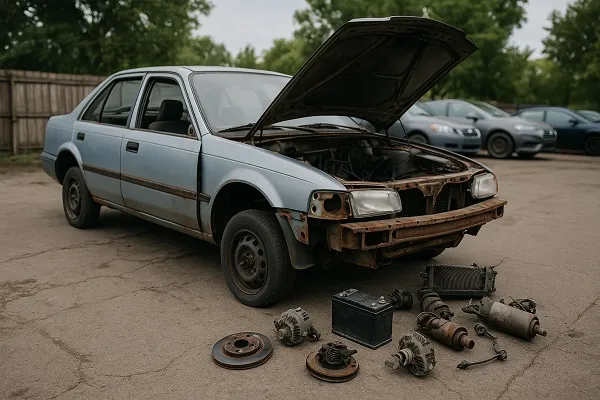Is it legal to strip a junk car in CO? Many Colorado vehicle owners face this question when dealing with an old, non-running car. In Colorado, junk car laws regulate how a car can be dismantled, what parts can be sold, and how environmental rules must be followed. Knowing these rules protects you from legal issues and ensures your vehicle disposal is handled properly.
Colorado Junk Car Laws Explained
Colorado has strict regulations around junk cars, especially when it comes to ownership, dismantling, and recycling. These rules are meant to prevent illegal dumping and protect the environment from hazardous waste.
If you plan to strip a junk car in Colorado, you must legally own the vehicle or have written authorization from the registered owner. Even if the car looks abandoned, stripping it without permission is considered theft.
Key Legal Requirements:
- You must have the vehicle title or proper ownership documentation.
- The stripping must take place on your private property and not public land.
- You must follow local city or county zoning and environmental codes.
- All hazardous materials, like oil or coolant, must be properly disposed of.
When It’s Legal to Strip a Junk Car in Colorado
If the junk car is yours and it’s on your property, you are generally allowed to strip it. However, Colorado law requires that the process be done responsibly.
For example, draining fluids and removing hazardous materials must be handled according to the Colorado Department of Public Health and Environment’s guidelines. Violating these rules can lead to penalties, even if you own the car.
Legal Scenarios Include:
- You own the junk car and it’s stored on private property.
- Fluids are drained and recycled safely.
- Parts are sold through licensed auto recyclers.
- The vehicle’s remains are disposed of at a certified junkyard.
What Happens if You Strip a Junk Car Illegally in Colorado

Stripping a junk car illegally in Colorado can result in serious fines or even criminal charges. Illegal auto dismantling is treated as a form of vehicle theft or environmental violation, depending on the circumstances.
Even if a car has been abandoned for months, you can’t legally remove parts until you’ve gone through the Colorado abandoned vehicle process, which involves notifying law enforcement and applying for ownership.
Potential Penalties:
- Fines for unlicensed dismantling or environmental damage.
- Criminal charges for unauthorized stripping or part sales.
- County code violations for property nuisances.
How to Strip and Dispose of a Junk Car the Right Way
To stay within Colorado junk car laws, follow a few clear steps when stripping and disposing of your vehicle.
Step-by-Step Guide:
- Confirm Ownership
Make sure your name is on the vehicle title. If the title is missing, you can request a duplicate from the Colorado DMV. - Drain and Dispose of Fluids Safely
Drain oil, antifreeze, brake fluid, and transmission fluid carefully. Take them to a certified recycling center or hazardous waste facility. - Remove Valuable Parts
Items like catalytic converters, batteries, and tires can be reused or sold if handled correctly. - Sell or Recycle Parts Legally
Only sell parts through licensed junkyards or recycling facilities. Always request a receipt or bill of sale. - Notify the Colorado DMV
Once the car is completely stripped and no longer drivable, inform the DMV so the title can be marked as “junked” or “salvage.”
Selling Stripped Auto Parts in Colorado
Selling stripped auto parts in Colorado is legal if you comply with the state’s vehicle recycling and sales regulations. However, selling parts from multiple vehicles may require a salvage or dismantler license from the Colorado Department of Revenue.
To protect yourself:
- Keep detailed records of all sales and parts removed.
- Never sell unverified or stolen vehicle components.
- Use licensed recycling centers for large or hazardous parts.
These precautions prevent legal problems and build trust with buyers.
Environmental Rules for Junk Car Stripping in Colorado
Colorado enforces environmental laws to prevent soil and water contamination from vehicle fluids and materials. Stripping a junk car carelessly can cause hazardous waste violations.
Follow these eco-friendly guidelines:
- Do not pour oil, gasoline, or coolant onto the ground.
- Dispose of old tires and batteries through authorized recycling programs.
- Transport the remaining frame to a certified scrap metal yard or junkyard.
Complying with these rules not only avoids fines but also helps keep Colorado’s environment clean and safe.
Local County Rules on Junk Car Stripping

Different counties in Colorado may enforce their own junk car ordinances. Cities like Denver, Aurora, and Colorado Springs have stricter codes about where and how junk vehicles can be stored or dismantled.
For instance, Denver’s local ordinances often require junk vehicles to be removed within a certain number of days or kept out of public view. In rural counties, you might have more flexibility but still must comply with environmental laws.
Common Local Rules:
- Junk cars cannot be visible from public roads.
- Only a limited number of vehicles can be stored on residential property.
- Noise and pollution rules may restrict dismantling hours.
Always check with your county’s zoning or code enforcement department before stripping a vehicle.
Alternatives to Stripping a Junk Car Yourself
If stripping a junk car yourself feels complicated, Colorado offers several legal and convenient alternatives.
Popular Options:
- Licensed Junk Car Buyers: These companies handle all paperwork, towing, and recycling legally.
- Auto Recycling Centers: Certified recyclers can strip and dispose of parts safely and even pay you for valuable materials.
- Donation Programs: You can donate a junk car to a nonprofit organization and receive a tax deduction.
These options help you stay compliant while saving time and effort.
Why Following Colorado Junk Car Laws Matters
Handling your junk car legally in Colorado ensures that you avoid penalties, protect your property, and help preserve the environment. It also supports the state’s efforts to maintain fair and sustainable recycling practices.
When you strip or sell your junk car the right way, you turn a potential liability into a responsible and profitable opportunity. Legal junk car disposal in Colorado benefits everyone—owners, recyclers, and the environment alike.
Content reviewed and published by Sell My Car Colorado Editorial Team.
